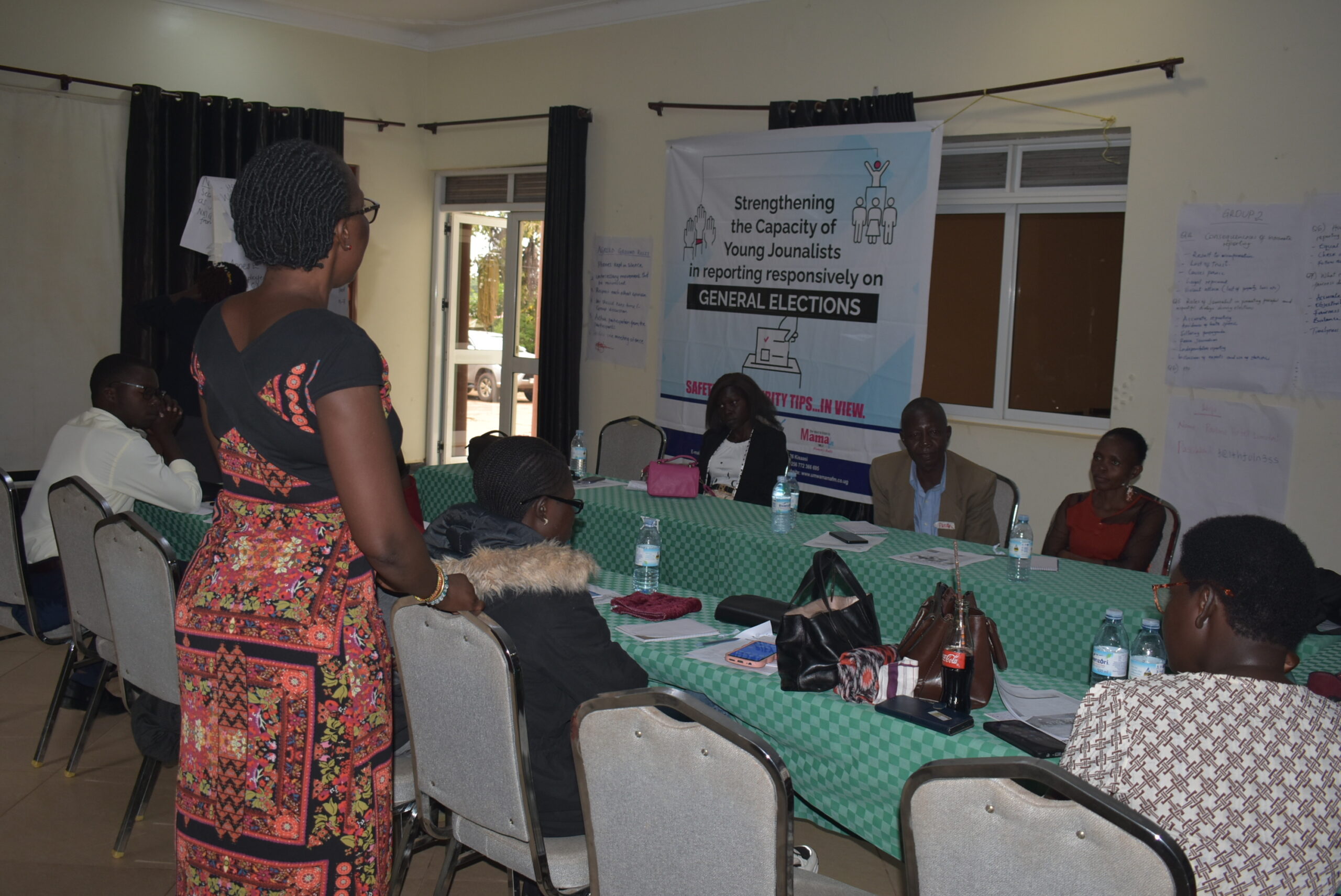
 Speak FM
Speak FM

 Speak FM
Speak FM
19 August 2025, 6:36 pm
By Emmy Daniel Ojara
Ms Agnes Agilo remained composed as she shared her harrowing experience. She smiled, but her eyes were sharp and intense, almost snake-like.
Dressed in a reddish-black, multi-floral African nytil outfit, with braided hair and a glint in her eye, Ms Agilo told fellow journalists: “Honestly, I no longer feel like covering the 2026 general elections, but I feel re-energised because of this training and support from the Uganda Media Women’s Association (UMWA) and Mama FM.”
Ms Agilo recounted her ordeal with security while covering the presidential and parliamentary elections in 2021. Based at Lira City’s Radio Wa, she was deployed by her supervisor to report and provide live updates on polling in Kwania District, part of the Lango sub-region.
Reflecting on the experience, she said: “It was such a bitter experience for me. Covering the elections was extremely difficult.”
She shared her story with selected journalists from the Lango and Acholi sub-regions during an empowerment workshop at Pauline’s Hotel in Lira City, held under the initiative “Strengthening the Capacity of Young Journalists in Reporting Responsively on General Elections.”
The middle-aged journalist, now a news editor and anchor at Radio Wa, said the day started well until tensions flared at the mention of incumbent President Yoweri Museveni’s close rival, musician-turned-politician Robert Kyagulanyi, alias Bobi Wine.
While giving a live update on the phone, Ms Agilo said a UPDF soldier at the polling station became hostile upon hearing Bobi Wine’s name.
“The soldier came close to me, asking what I was doing at the polling station and why I mentioned Bobi Wine. I told him I am a journalist giving a live update, but he insisted: ‘Why do you have to do that?’” she recalled.
She added: “Shortly after, hell broke loose. The soldier grabbed me, dragged me several metres from the polling site, hit me, and within minutes, I found myself in a dark room where I was held for about two hours before being released.”
Bobi Wine of the National Unity Platform (NUP) was declared runner-up in the 2021 presidential elections, won by incumbent Yoweri Kaguta Museveni of the National Resistance Movement (NRM).
“Inside, I was tortured, beaten, and later released without my recorder. My phone also became damaged. I cannot forget that experience. Talking about the opposition during Uganda’s elections is extremely challenging,” Ms Agilo added.
Although she was wearing tight jeans, her ordeal did not end with the security’s brutality; it continued to haunt her at the workplace.
When she returned, her supervisor refused to believe her account and instead ordered her back to the polling station—a task she declined. Consequently, she was suspended for two weeks for alleged gross misconduct and incompetence. The station’s board of governors later reviewed the decision and reinstated her.
Despite this, she suffered losses, including a damaged recorder, a faulty phone, bodily injuries, and trauma. Fear prevented her from reporting the incident to the authorities.
Ms Agilo’s story reflects the many challenges journalists face while covering elections in Uganda. Many endure physical and psychological scars from their work.
Ms Sinika Agenorwot, a young and energetic journalist, also recounted her experiences covering the NRM party primaries in Kitgum Municipality.
In August, she was deployed to Opete Village in Labongo Amida Sub county to cover the lower council elections, which involved three contenders. Wearing her press jacket and identification tag, she was nevertheless denied access to polling stations.
A polling official reportedly told her: “This is our election; we have the right to do anything here, including blocking journalists. You are not allowed in.”
Ms Agenorwot, in her early twenties, was prevented from covering the polls despite suspecting malpractices.
These experiences highlight the numerous challenges journalists face in accessing information during elections in Uganda, including denial of access, harassment, threats, and violence.
The 2021 general elections were marred by violence, with injuries and deaths recorded. Ahead of the 2026 elections, sporadic cases of violence and rights abuses have already been noted, with journalists and opposition politicians as the main victims.
In response, the Uganda Media Women’s Association (UMWA) and Mama FM are supporting journalists—70% female and 30% male—through the initiative “Strengthening the Capacity of Young Journalists in Reporting Responsively on General Elections,” funded by the Finnish Foundation for Media and Development (VIKES).
The project aims to enhance journalists’ professional and ethical skills, improve awareness of safety and security measures during elections, and equip them with practical tools to mitigate risks in the field, as explained by Ms Catherine Apalat, Project Coordinator at UMWA/Women in Media.
Support has been extended to journalists in Mbarara, Kampala, Acholi, Lango, and Karamoja regions as Uganda approaches the 2026 general elections, where media practitioners will face both opportunities and challenges, from providing accurate, timely, and balanced reporting to dealing with harassment, intimidation, arrests, and attacks while covering political events.
Emmy Daniel Ojara is the Sub-News Editor at Speak FM.